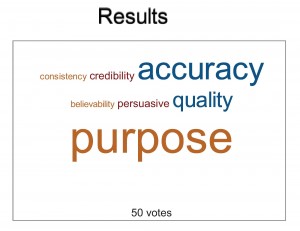In class, we discussed ideas for defining criteria as required for Major Essay #2. We examined real-world examples of criteria used in various evaluation processes:
- Five Criteria for Evaluating Webpages
- Scoring Criteria for Smarter Cities
- New Energy Congress—Technology Review Criteria
The criteria below could be quite useful when evaluating the rhetorical effectiveness of a literary or film text:
- Logos—the logical appeal. When evaluating the logical appeal of a text, consider whether the work includes or avoids common logical fallacies. How well does the work withstand intellectual criticism?
- Ethos—the ethical appeal. How well does the speaker establish her own credibility with an audience?
- Pathos—the emotional appeal. How well does the work create a sense of emotional involvement in the reader or viewer?
- Sensory Appeal—consider how well a work appeals to an audience’s sensory perceptions by using sound, rhythm, or visual imagery to make a reader/viewer’s experience more tangible or memorable; consider descriptions of smell or texture as well.
- Structure—consider the structure or organization of a work as a criterion for evaluation (whether the sequence of events or the order of evidence presented is rhetorically effective).
- Audience—consider whether the ability of a work to reach a broad audience or a limited audience could be used as a criterion for evaluation (this criterion could be a subcategory of the ethical appeal).
- Other criteria can be useful depending on which aspects of a text you consider most important. On Monday, the class created a word cloud of additional words to consider as criteria for evaluating texts:



Add a Comment
You must be logged in to post a comment.